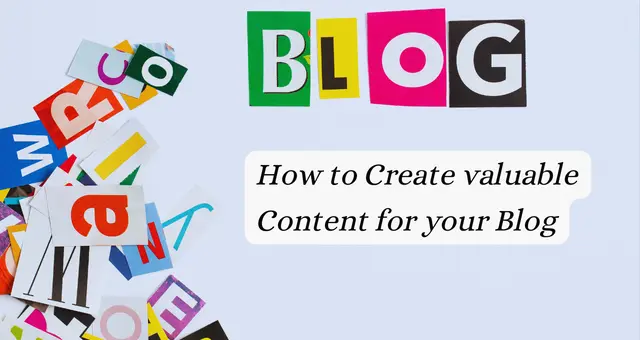To Create valuable content for blogging is both an art and a science. It requires a blend of creativity, strategic planning, and understanding of your audience. In the digital age, where content is king, the challenge isn’t just to produce content but to make it valuable and engaging for your readers.

This comprehensive guide will walk you through the essential steps and strategies to create content that resonates with your audience and drives engagement. Moreover, we’ll delve into the role of User-Generated Content (UGC) creators and campaigns, highlighting their significance in enriching your content strategy.
Table of Contents
How to Create Valuable Content for Blogging
1. Know Your Audience
Understanding your audience is the cornerstone to create valuable content for blogging. It’s crucial to know who your readers are, what they care about, and what problems they are trying to solve. Use analytics tools, surveys, and social media interactions to gather insights about your audience’s demographics, interests, and behavior.
2. Define Your Content Goals
Before you start to create valuable content for blogging, define what you want to achieve with it. Whether it’s to drive traffic, increase engagement, build brand awareness, or generate leads, having clear goals will help guide your content strategy and measure its success.
3. Research and Choose Your Topics Wisely
The relevance of your topics to your target audience determines the value of your content. Use keyword research tools and monitor industry trends to find topics that interest your audience. Also, consider the questions your audience is asking online to create content that provides answers and solutions.
4. Create High-Quality and Original Content
Quality and originality are what set your content apart in a crowded digital landscape. Invest time in creating well-researched, well-written, and visually appealing content. Ensure your content is informative, engaging, and provides value to your readers.
5. Optimize for SEO
Search Engine Optimization (SEO) is essential for making your content discoverable. Use relevant keywords naturally, optimize your headlines and meta descriptions, and structure your content for readability. Remember, SEO is about being visible to your audience when they search for information related to your niche.
6. Leverage UGC Creators
UGC creators are a goldmine for brands looking to add authenticity and relatability to their content strategy. They can range from passionate customers sharing product reviews to influencers posting about your brand on social media. By incorporating content from UGC creators, you tap into their followers and bring a fresh perspective to your brand.
UGC Campaigns
Running UGC campaigns is an effective strategy to encourage more user-generated content. These campaigns can significantly boost engagement and create buzz around your product or service.
An inspiring example is the “Unsent Message Project” by Monthsary, which gathers unsent love letters for repurposing on social media. Such campaigns not only generate content but also build a community around your brand.
7. Engage with Your Audience
Engagement is a two-way street. Respond to comments, participate in social media discussions, and encourage feedback. Engaging with your audience builds trust and loyalty, making your content more valuable to them.
8. Analyze and Adapt
Finally, use analytics to track the performance of your content. Look at metrics like page views, engagement rates, and conversion rates to understand what works and what doesn’t.
Be prepared to adapt your content strategy based on these insights to continually improve the value of your content.
Conclusion
To create valuable content for blogging is a continuous process of learning about your audience, adapting to their needs, and staying ahead of industry trends.
By incorporating UGC creators and campaigns into your strategy, you can enrich your content’s authenticity and engagement. Remember, the most valuable content is that which solves problems, informs, entertains, and connects with your audience on a deeper level.
